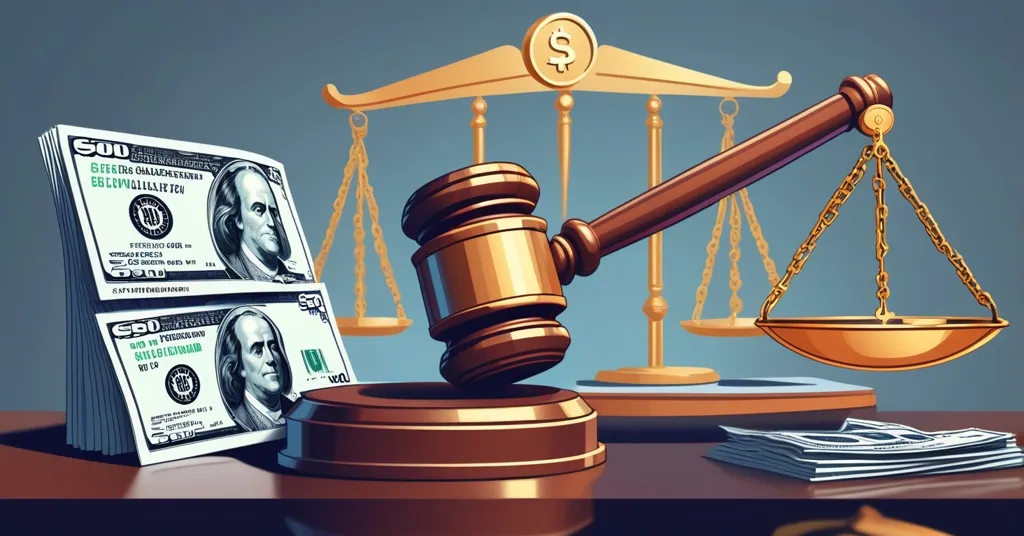SEC and Ripple Settle for $50M, Paving Way for Crypto Regulation Clarity

SEC and Ripple Settle Dispute with $50 Million Deal, Marking a Milestone in Crypto Regulation
The SEC and Ripple Labs have settled their long-running legal battle for $50 million, with $125 million returned from escrow. This settlement, which awaits court approval, preserves the July 2023 ruling on XRP sales and could set a precedent for future crypto regulation.
- SEC and Ripple settle for $50 million
- $125 million returned from escrow
- July 2023 ruling on XRP sales preserved
The SEC’s legal battle with Ripple, which kicked off in December 2020, has been a rollercoaster ride through the crypto regulatory landscape. The SEC accused Ripple of conducting unregistered securities offerings through XRP sales, setting off a high-stakes drama that’s been followed by the crypto community with bated breath. The July 2023 ruling was a pivotal moment, distinguishing between Ripple’s institutional sales, which were found to violate securities laws, and its programmatic and secondary sales, which did not. In a nutshell, this ruling meant that while selling XRP to big investors was a no-go, selling it to the general public was okay.
Now, the settlement motion, filed in the Southern District of New York under Judge Analisa Torres, seeks an “indicative ruling” under Rule 62.1. What’s that, you ask? It’s just a fancy way to say a preliminary decision that helps move the settlement forward. If approved, it will return the case to the district court for final approval, and all appeals will be withdrawn. The $50 million civil penalty, as confirmed by the SEC, aligns with federal securities law and meets the Second Circuit’s standards for fairness and legality. It’s a hefty sum, but it’s better than the regulatory limbo that could have dragged on forever.
The market’s been buzzing since the news broke, with XRP experiencing an 8% price surge in the past 24 hours. Investors are clearly optimistic, and this could be the start of a rebound for XRP and the broader crypto market. But let’s not get too carried away—while this is a big win for Ripple, the crypto regulatory landscape is still as unpredictable as a Bitcoin price chart on a rollercoaster.
Recent political shifts at the SEC, like the replacement of Gary Gensler with Mark Uyeda as Acting Chairman under President Trump, hint at a potential shift toward a more balanced regulatory approach. The formation of a Crypto Task Force led by Commissioner Hester Peirce further indicates a push for a comprehensive regulatory framework for digital assets. Could these changes have played a role in the settlement? It’s possible. And it’s a glimmer of hope for those of us who dream of a more crypto-friendly regulatory world.
Experts have been quick to chime in. Defense attorney James Filan outlined the procedural steps following an indicative ruling, while XRP advocate John Deaton expressed confidence that Judge Torres would lift the injunction. Crypto analyst John Squire went as far as calling the settlement a “surrender” by the SEC, marking a significant victory for Ripple and a potential turning point for XRP’s regulatory standing. Lawyer Bill Morgan noted that Judge Torres’s approval isn’t automatic and requires an assessment of public interest, pointing out the significant support from over 80,000 XRP holders as a potential influencing factor.
The SEC and Ripple Labs jointly filed a motion today seeking court approval for a $50 million settlement agreement that would end their long-running legal dispute and dissolve the current injunction against Ripple.
The settlement preserves the court’s July 2023 summary judgment ruling, which determined that Ripple’s institutional XRP sales violated securities laws while finding its programmatic and secondary sales did not.
Both parties highlighted the public interest in efficiently resolving the case.
The SEC confirmed the $50 million civil penalty aligns with federal securities law and meets the Second Circuit’s established standards for fairness and legality.
But let’s not forget the broader implications. This settlement isn’t just about Ripple and XRP; it could set a precedent for how similar cases are handled, affecting the entire crypto industry. The potential for a more balanced regulatory approach, coupled with the public support for Ripple, could pave the way for a more favorable environment for blockchain companies. But the road ahead is still uncertain, and we need to stay vigilant as the regulatory landscape continues to shift.
Now, let’s get real for a moment. While this settlement is a step forward, it’s crucial to keep pushing for a financial revolution that disrupts the status quo and embraces the principles of effective accelerationism (e/acc). Bitcoin may be the king of cryptocurrencies, but let’s not overlook the vital roles that altcoins and other blockchains, like Ethereum, play in this ecosystem. They fill niches that BTC itself may not serve well, and that’s something even the most ardent Bitcoin maximalist can’t deny.
And let’s not forget the importance of decentralization, freedom, and privacy in the world of crypto. This settlement might be a big deal, but it’s just one piece of the puzzle in our quest for a truly decentralized future.
Key Takeaways and Questions
- What was the total amount Ripple agreed to pay in the settlement?
Ripple agreed to pay $50 million to the SEC as part of the settlement.
- What will happen to the remaining funds held in escrow?
The remaining $125 million held in escrow will be returned to Ripple.
- What was the key ruling from July 2023 that the settlement preserves?
The July 2023 ruling found that Ripple’s institutional XRP sales violated securities laws, while its programmatic and secondary sales did not.
- What is the next step after the indicative ruling is granted?
If the indicative ruling is granted, the case will return to the district court for final approval of the settlement terms.
- Why do both parties believe the settlement is in the public interest?
Both parties emphasized that efficiently resolving the case serves the public interest by providing clarity and finality to the legal issues at hand.



